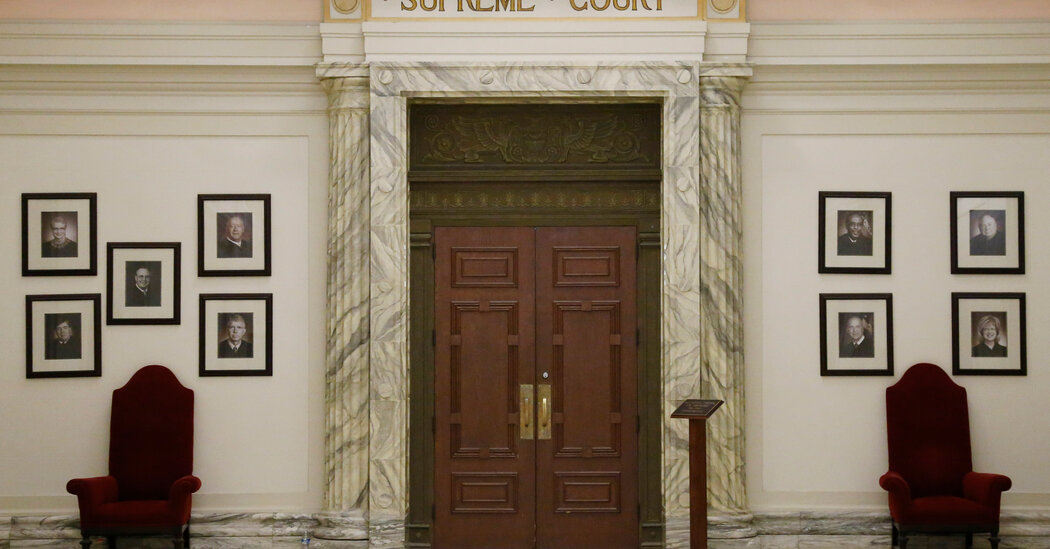The Oklahoma Supreme Court blocked on Tuesday what would have been the nation’s first religious charter school, delivering a setback to a conservative movement that has increasingly fought for public dollars to go toward religious education.
The case is likely to be appealed, potentially pushing it toward the U.S. Supreme Court, whose conservative majority has broadly embraced the role of religion in public life and signaled an openness to directing taxpayer money to religious schools.
The proposed school, St. Isidore of Seville Catholic Virtual School, was pitched as an online Catholic school for students in rural areas and throughout the state of Oklahoma, with religious instruction woven throughout the curriculum.
But instead of operating as a private school with families paying tuition, St. Isidore applied for status as a charter school, a type of public school that is financed by taxpayer dollars, but run independently.
The plan, which was being widely watched for its potential to set a national precedent, met an obstacle in the Oklahoma Supreme Court, which ruled that a religious charter school would violate the state constitution.
“Enforcing the St. Isidore contract would create a slippery slope,” the court wrote, directing the state to rescind its contract with St. Isidore. Six justices agreed, while two dissented all or in part.
The Catholic archbishop of Oklahoma City, Paul S. Coakley, and the bishop of Tulsa, David A. Konderla, called the ruling “very disappointing.” “We will consider all legal options and remain steadfast in our belief that St. Isidore would have and could still be a valuable asset,” they said in a statement on Tuesday.
Charter schools, which came into being in the 1990s, have long operated in a kind of hybrid space in education.
Like traditional public schools, they are free to attend and are paid for out of public coffers. But they are independently run, their teachers typically are not unionized, and they are meant to offer more options to families. Students can enroll from any school zone, for example. In 2021, 7 percent of all public school students attended a charter school.
The case comes as the school choice movement — historically a bipartisan effort, with the support of many reform-minded Democrats as well as Republicans — has taken a sharp turn to the right. Capitalizing on parents’ discontent over pandemic school closures, a wave of Republican-led states have passed new legislation supporting school vouchers, education savings accounts and other options that families can use to pay for the education of their choosing. That can include home-schooling, microschools and private schools.
The case in Oklahoma, which would have removed parents as intermediaries and directly financed a religious school, was seen as the next frontier.
Yet it was divisive within the school choice movement and even within Oklahoma’s Republican Party.
Gov. Kevin Stitt and his superintendent of public instruction, Ryan Walters, both Republicans, supported the new school. But the state’s Republican attorney general, Gentner Drummond, was a key opponent of the school, and personally argued against it before the Oklahoma Supreme Court.
It is possible that the case will ultimately be decided by the U.S. Supreme Court, a prospect supporters of St. Isidore have welcomed from the beginning.
In previous cases in 2020 and 2022, the Supreme Court ruled that Montana and Maine could not exclude religious schools from state programs that allowed parents to use government-financed scholarship or tuition programs to send their children to private schools. In both cases, Chief Justice John G. Roberts Jr. wrote that the rulings did not require states to support religious education, but that if a state were to choose to subsidize any private schools, it could not discriminate against religious ones.
Backers of St. Isidore say a similar argument applies to charter schools. Excluding religious entities from operating charter schools, they say, amounts to discrimination.
But many traditional supporters of charter schools do not agree, maintaining that charter schools are fundamentally public schools, which therefore have no place for religious teaching.
The case comes down to “two competing constitutional claims,” said Justin Driver, a professor at Yale Law School: “Nondiscrimination against religion, on the one hand, and the nonestablishment of religion on the other.”
The answer may lie in a more philosophical question: What, exactly, is a charter school? “Is a charter school a public school?” Mr. Driver said. “Or is a charter school, in effect, a quasi private entity?”
Oklahoma officials wrestled with this tension before approving St. Isidore in a 3-2 vote last year by the Oklahoma Statewide Virtual Charter School Board, an obscure state board made up of appointees by Mr. Stitt and leaders of the Republican-controlled State Legislature.
The deciding vote came from a new member who was appointed only a few days before the vote. The group’s chairman voted no, and later resisted signing the contract with St. Isidore, saying that he believed it was a violation of the state constitution.
The school had been scheduled to open in August, but that now appears out of reach.
